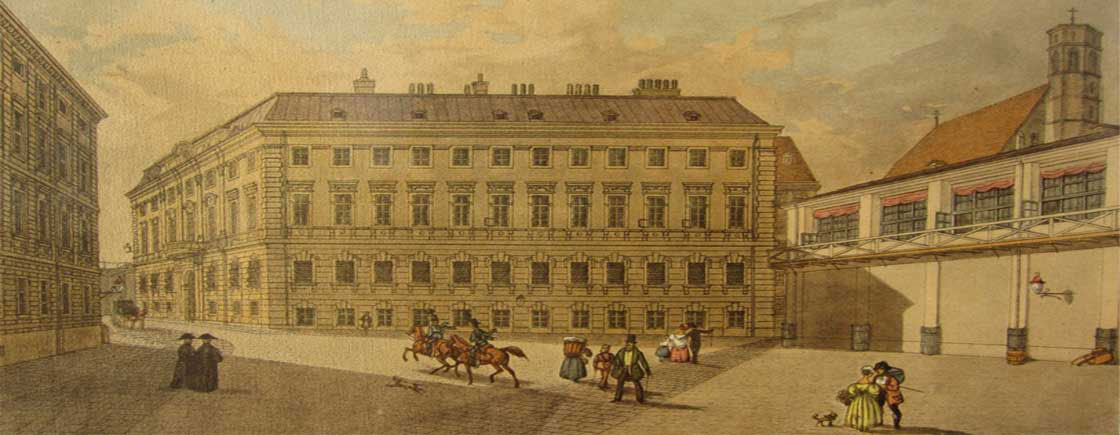Research Group:
"Cultural Exchange and Diplomacy"
JSPS Grant-in-Aid for Scientific Research (B)

Ballhausplatz, Vienna
Research Objectives
The present research attempts to clarify how diplomatic relations, mainly in Japan and Europe since the modern period, have transformed themselves in time, with a central focus on cultures and cultural exchanges.
The notion of “culture” is multifarious, encompassing both “high culture” such as classical music and “pop culture” such as manga and anime. Moreover, some include in their interpretation of “culture” not only the traditional types of cultural activities such as music, fine art and literature but also customs and social conventions, while to others the word “culture” is inclusive of all fields outside politics and economy.
The present research follows the concept of “culture” in recent studies in international relations, not limiting the notion of “culture” to traditional “high culture” but understanding it as a field of various human activities which includes the anthropological concept of culture.
Joseph Nye has argued for the importance of “soft power,” which aims to increase a country’s influence not by force but by exporting its values and cultural preferences, as opposed to “hard powers” such as military and economic powers. Nye’s concept has been applied to actual diplomatic policies; “public diplomacy,” which places emphasis on cultural publicity and image-making, is becoming an important part of foreign policies not only in the United States but also in the EU nations and Asia, including China and Japan.
In this context, it is no coincidence that a new movement has emerged in the analytical discourse of diplomacy, seeking to reconsider the traditional understandings of diplomacy. This new current, called the New Diplomatic History, focuses on the importance of such “peripheral” areas as diplomats’ private concerns and friendships, as well as the influence of media, which do not fit into the framework of conventional study of diplomatic history.
From the perspective of traditional diplomatic history, diplomacy is a negotiation in which nations are engaged in order to coordinate their interests, and diplomats who are concerned in the process are merely spokespersons for their national interests. On the other hand, the New Diplomatic History sees a diplomat not as a tool to execute his/her nation’s commands mechanically, but as an autonomous individual who acts according to his/her own beliefs; it argues that diplomats’ actions outside the framework of official diplomatic activities greatly influence actual diplomacy.
In the age of the “new diplomacy” after World War I, main agents of diplomacy shifted from individuals to organizations, and emphasis began to be placed on cultural publicity and propaganda. On the other hand, it was also in this period that the importance of politically neutral cultural exchanges among nations began to gain recognition, and governmental agencies were established in order to introduce their countries’ cultures to others. Such activities, which became even more popular after World War II, have drawn attention as forms of “cultural diplomacy,” “public diplomacy,” and “Kulturpolitik.”
Taking into account these changes in recent international politics and diplomacy studies, the present research focuses on the cultural aspect of modern diplomacy for international comparison, especially the cultural exchange and “cultural diplomacy” conducted by diplomats, foreign offices and other governmental agencies.
The time period with which the present research project is concerned encompasses the era of the “old diplomacy” in the latter half of the nineteenth century, the interwar period of the “new diplomacy,” and the post-war period in which cultural diplomacy developed. The countries concerned are Japan, the United Kingdom, France, Germany, Italy, and the Habsburg Empire; “cultural exchanges” of diplomats dispatched from these countries to such “frontiers” as Asia, Africa, the periphery of Europe and the Americas will be analyzed. When treating the post-war “cultural diplomacy” and “public diplomacy,” however, the main focus of analysis will be on governmental agencies and organizations rather than individuals.
“Culture” in the broad sense of the word, which includes not only the “high culture” such as literature and fine arts but also value systems and lifestyles of people, is a key concept to understand modern international politics and to lead international disputes to peaceful resolutions. Culture can be a wall that divides one country or individual from another, but it can also be a tie that connects them. While an encounter with different cultures often invites conflicts, a great cultural achievement has a power to attract people from other cultural spheres.
Development in globalization, especially the diffusion of the Internet, has increased and quickened the flow of information to an unprecedented degree. Experiencing other cultures is no longer a privilege of the few but part of daily lives of average citizens. It is not unrelated to this situation that the international environment surrounding Japan is becoming tenser than ever. The lives of diplomats, who faced foreign cultures and societies and attempted serious dialogue with them, are highly suggestive of the ways in which Japan should move forward.
